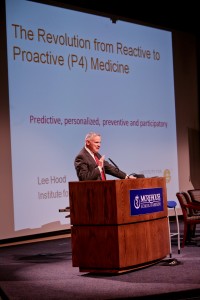Governor Nathan Deal was joined by Ambassador Andrew Young, Georgia State Representative Calvin Smyre and Leroy Hood, founder of the Institute of Systems Biology, in formally proclaiming September 1, 2011 Personalized Medicine Awareness Day in the State of Georgia.

Georgia Governor Nathan Deal presents Morehouse School of Medicine’s Dean and Executive Vice President, Valerie Montgomery Rice, MD, with a state proclamation declaring Sept. 1, 2011 Personalized Medicine Awareness Day in Georgia.
The event at Morehouse School of Medicine (MSM) was sponsored by Georgia Bio; the Atlanta Clinical & Translational Science Institute (ACTSI, which is funded by the NIH and led by Emory University with partners MSM and Georgia Tech); and Iverson Genetics, Inc.
“The collaboration within the ACTSI between these three research universities is an important undertaking and an example of how it should be done,†remarked Governor Deal as he kicked off the day’s program.
A visionary in the personalized medicine field, Dr. Hood developed the DNA gene sequencer and synthesizer and the protein synthesizer and sequencer – four instruments that paved the way for the successful mapping of the human genome.
During his keynote address he proposed a revolution in medicine.  P4 Medicine – Predictive, Preventive, Personalized and Participatory – is a proactive (instead of a reactive) approach to medicine. The paradigm change will drive radical changes in science.
For P4 medicine to succeed, a cross-disciplinary culture with team science and new approaches to educating scientists, as is done through the ACTSI, has to take place. Dr. Hood predicts the human genome will be part of individual medical records in 10 years.

Leroy Hood, MD, PhD
“The vision of P4 medicine is that each patient will be surrounded by a virtual cloud of billions of data points. Advances in science and technology will reduce this enormous data dimensionality to simple hypotheses about human health and disease,†says Hood.
“The ultimate outcome is to create individualized patient disease models that are predictive and actionable. The shift to P4 Medicine will also require societal changes.”
Personalized Medicine Awareness Day celebrated the first-of-its-kind personalized medicine study, approved by the Centers for Medicare and Medicaid Services. The study will determine the utility of genetic testing in calculating doses and reducing the incidence of adverse events associated with the initiation of Warfarin therapy. Warfarin is the world’s leading anti-blood clotting drug.
Researchers hope the study will provide data to demonstrate that individualizing treatment can improve patient safety and reduce healthcare costs, says Dean Sproles, CEO of Iverson Genetics, Inc., which is collaborating in the study with MSM and the ACTSI.
Governor Deal congratulated the ACTSI for leading the landmark Warfarin study with Iverson and is “proud that Georgia will be leading the effort.â€
The Warfarin Study is led by ACTSI Senior Co-Principal Investigator Elizabeth Ofili, MD, MPH, director of the Clinical Research Center, chief of cardiology and associate dean for clinical research at MSM, and will engage 50 sites across the country and 7,000 participants. The first participant was recently enrolled at Grady Memorial Hospital.
“This study should help us understand how to use each patient’s genetic information to deliver a safer and more effective dose,†says Ofili.
Sproles noted, “The study is evidence of the growing role of genetics in helping doctors to develop optimal individual treatments for their patients.â€
A panel including Emory medical leaders David Stephens, Fred Sanfilippo and Kenneth Brigham discussed and addressed questions like how to communicate ‘big science’ to the individual, how to move genetic testing to medical outcomes and who owns genome data.
“Personalized Medicine is the future,†stated Governor Deal. The presence of Governor Deal, Ambassador Young and Representative Smyre is a sign that policymakers are beginning to recognize that personalized medicine is not just a vision for better healthcare; it has the power to improve health and reduce healthcare costs.
Posted on
September 9, 2011 by
admin
in Uncategorized






